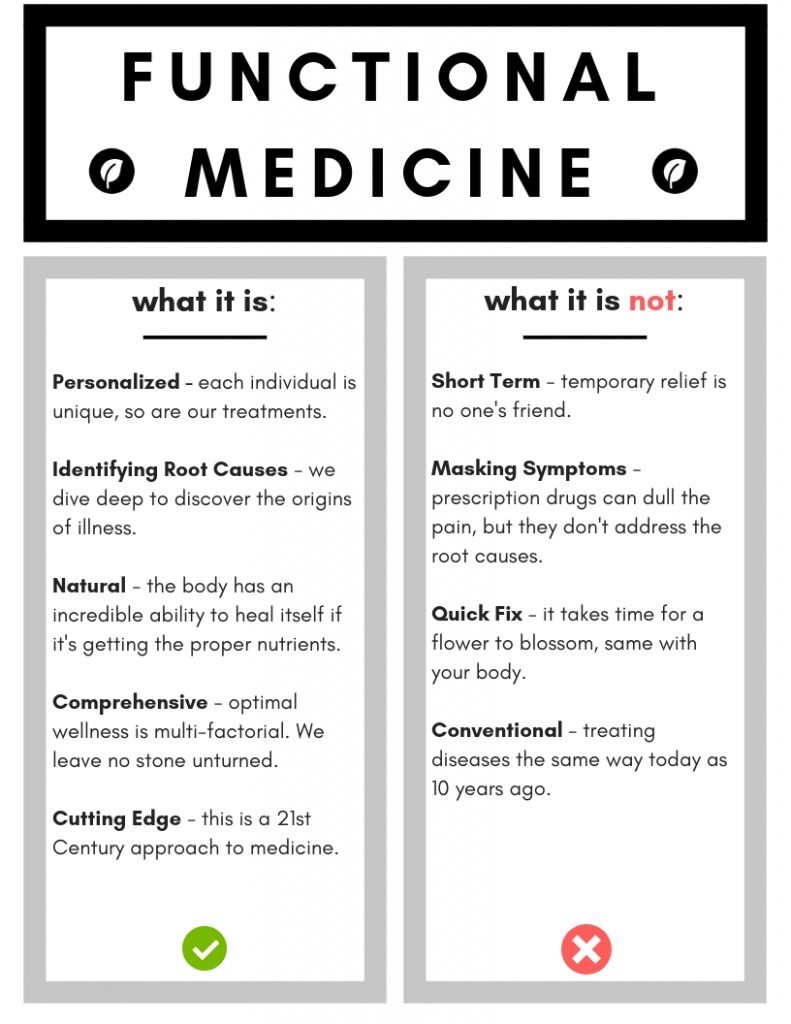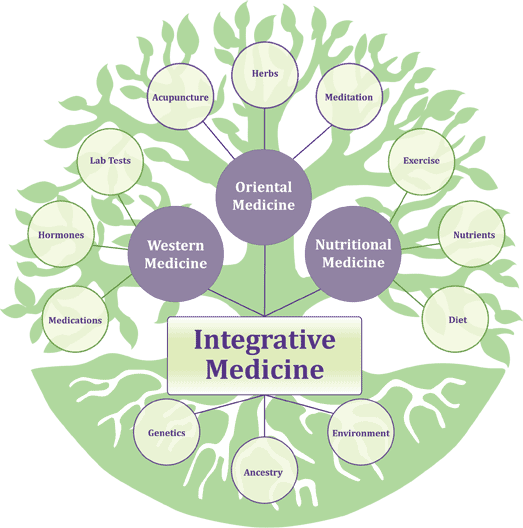
The healthcare arena has changed considerably in recent years with the rise of new methods that have been developed to address human health intricacies. Among such approaches are integrative and functional medicine which have become popular. Although they both adopt a similar holistic approach to healthcare, they differ philosophically, operationally as well as in application.
What Is Integrative Medicine?
Integrative medicine combines conventional medical treatments with complementary therapies, focusing on holistic care to address physical, emotional, and spiritual well-being for overall health.
Integrative medicine includes conventional Western medicine alongside complementary and alternative therapies. Instead of focusing on specific symptoms or diseases, this model ensures that patients are viewed holistically.
Integrative medicine focuses on the needs of the patient during the treatment process. Every individual requires personalized attention based on their specific issues, needs, requirements, or situations.
In its quest for wellness, this approach looks at every aspect in a person’s life including physical, emotional, mental, social and spiritual aspects.
Although it allows alternative therapies into its system of operation; this concept underscores evidence-based treatments. It attempts synthesizing conventional treatment with proven complementary therapy.
In many cases, it involves teamwork of doctors with other specialists like nutritionists and acupuncturists for comprehensive health services.
What Is Functional Medicine?
Functional medicine seeks to identify and address the root causes of disease by focusing on individual genetics, environment, and lifestyle, aiming for personalized, holistic treatment.
Functional medicine is a biological approach that focuses on the identification and elimination of root causes of ailments.
Instead of just treating symptoms, functional medicine seeks to discover the underlying causes of illness. It recognizes that one condition may have many causes.
This approach acknowledges that each person has unique genetic, biochemical, and lifestyle factors that influence their health. Such individual characteristics are used for formulating treatment regimens.
Like integrative medicine, functional medicine puts the patient at the center of care. However, it goes further in its emphasis on understanding the patient’s detailed personal and family history.
The golden thread running through this medical system recognizes that an organism is a single whole.
How Is Functional Medicine Put into Practice?
Functional medicine is practiced through comprehensive assessments, personalized treatment plans, and lifestyle interventions, addressing root causes of health issues rather than just symptoms.
In practice, functional medicine practitioners usually have a comprehensive approach.
This takes into consideration more than just medical history. This medicine also considers factors such as diet, lifestyle, environmental exposures, and emotional well-being.
It uses specialized tests to understand the nutritional status of a person, metabolic function and genetic factors.
Practitioners might include targeted nutritional therapies, lifestyle modifications, stress management techniques and sometimes prescription medications.
Functional medicine gives importance to gut health for overall wellness. This is an approach whereby nutrition and environmental factors interact with an individual’s genetic makeup.
What Are The Major Differences between Integrative and Functional Medicine?
Integrative medicine blends conventional and complementary therapies, while functional medicine focuses on personalized, root-cause treatments through lifestyle and environmental factors for holistic health.

Integrative Medicine brings together conventional and complementary approaches with a focus on healing the whole being. Diagnostic methods can be traditional or conventional.
Functional Medicine Primarily it emphasizes on finding root causes of chronic diseases through advanced diagnostic tools and targeted interventions. To uncover underlying imbalances/dysfunctions, advanced laboratory testing is used alongside detailed patient histories.
Integrative Medicine combines varied healing modalities, both conventional and non-conventional methods, which are emphasized by integrative medicine. A combination of conventional medical treatments and alternative therapies are used in integrative medicine practices.
Integrative medicine is frequently practiced by conventional doctors who have been trained conventionally but have also received training in complementary therapies.
Personalized systems-oriented interventions are used to address the root cause of diseases in functional medicine. It may incorporate conventional treatments if necessary but prefers addressing underlying imbalances first.
This can be carried out by different types of healthcare professionals, such as MDs, DOs, and naturopaths who have undergone training in specific areas of functional medicine.
What Is The Importance of Patient Engagement?
Patient engagement is crucial in functional and integrative medicine as it fosters active participation in care, enhances adherence to treatment plans, and improves overall health outcomes.
Integrative Medicine encourages patients to be more involved with their own healing journey rather than being passive recipients of treatment. This form of medicine requires less time commitment from physicians and patients alike.
Poorly implemented wellness plans in functional medicine may require the patients to adopt significant lifestyle changes. This may lead to extended interviews involving long hours of consultation and repeated monitoring.
How To Choose Between Integrative and Functional Medicine?
Choose based on your needs: Integrative medicine blends conventional and complementary approaches, while functional medicine focuses on root causes and personalized treatments.

Sometimes, the choice between integrative medicine and functional medicine depends on individual health preferences, needs, or goals. People looking for a blend of conventional and alternative approaches might prefer integrative medicine, while those suffering from complex chronic conditions that necessitate delving into root causes may choose functional medicine.
It is important to note that these approaches are not mutually exclusive. Many practitioners use both integrative and functional medical models in their practice as per each individual patient’s needs.
Is integrative medicine covered by Medicare?
Medicare generally does not cover integrative medicine treatments like acupuncture or nutritional counseling, but it may cover some services if they are part of conventional medical care.
Medicare generally neglects the use of integrative medicine. The focus is largely on evidence-based conventional treatments that are medically necessary. However, there are some services like acupuncture provided for chronic lower back pain which can be covered under certain circumstances but many inclusive therapies like homeopathy, naturopathy and other holistic treatments are typically excluded.
What is the downside of functional medicine?
The downsides of functional medicine can include higher costs, limited insurance coverage, and a potential lack of robust scientific evidence for some treatments and approaches.
Functional medicine’s downsides include high costs because it requires excessive examination and services that insurers do not cover. It might also lack strong scientific proof concerning some techniques, which has contributed to skepticism among medical professionals. Furthermore, it is impractical for some patients.
Are functional doctors worth the money?
Functional doctors may be worth the money for those seeking personalized, root-cause treatment and holistic care. However, it depends on individual health needs, preferences, and financial situation.
For individuals who are not getting results from traditional medicine but are willing to pay for a custom-made approach to wellness, functional doctors can be worthwhile. Nevertheless, inconsistent outcomes and no insurance coverage necessitate a careful consideration of the benefits of this treatment.
Conclusion
Both integrative and functional medicine have useful approaches to healthcare that emphasize individualized care for patients. Integrative medicine focuses on combining conventional and alternative therapies, while functional medicine delves deeply into root causes using advanced diagnostics.
Knowing these dissimilarities may enable individuals on their health journey to make informed choices that could lead to more comprehensive and effective treatment results.

